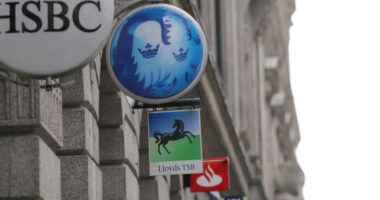
Covid lockdowns and the Bank of England’s pandemic-era money printing programme are partly to blame for the cost of living crisis, the central bank’s chief economist has suggested.
Huw Pill, who took the influential role on Threadneedle Street last year, said gas prices were the largest driver, adding around 4 percentage points to inflation, which is at a 40-year high of 10.1 per cent.
But even before Russia’s invasion of Ukraine in February, which caused gas prices to spike, inflation was already at 6.2 per cent – more than three times the Bank’s target of 2 per cent.


Bank of England chief economist Huw Pill said pandemic-era money printing programme are partly to blame for the cost of living crisis
Speaking to the House of Lords economic affairs committee, Pill admitted the Bank played a part in driving up inflation through its massive money-printing programme.
Known as quantitative easing (QE), this pumped £450billion into the economy during 2020.
Pill also blamed the huge mismatch between supply and demand in the aftermath of Covid lockdowns for pushing the price of goods ever higher.
The comments could make uncomfortable reading for Bank Governor Andrew Bailey, who oversaw the explosion in QE, and new Prime Minister Rishi Sunak, who as chancellor was at the heart of the Government’s response to Covid.
Gas prices do not ‘explain all of the overshoot’ in inflation, said Pill. One factor, he said, was ‘developments in the past – including choices over monetary policy’.
Warning that ‘QE and the choices over QE may have contributed’ to the rise in the cost of living, Pill added: ‘I was not at the Bank two or three years ago when some of those rounds of QE were undertaken. Whether those would be chosen to do now is an open question.’
He also suggested that lockdowns – and the support offered to households and businesses through the pandemic such as the furlough scheme – played a part as they boosted demand at a time when the supply of goods and services was severely hit.
‘Looking back at the impact of the pandemic, I think one can say that destruction of demand was over-emphasised relative to the destruction of supply,’ he said.
‘The support coming from the macroeconomic side – both fiscal support and monetary support –was very profound.’
QE was first used in the aftermath of the financial crisis in an attempt to ease the severe recession which hit the UK in 2008.
It involved buying bonds from investors – mainly government bonds known as gilts – reducing borrowing costs and freeing up cash for those investors to plough into the economy.
But critics say that during the pandemic, this helped to fuel demand by propping up buying activity while ignoring the supply problems caused by lockdowns, when businesses were forced to shut their doors.
When economies reopened, there was a surge in demand that could not be met, driving up prices and causing workers to demand higher wages.
Andy Haldane, Pill’s predecessor at the Bank, predicted as much when he began warning early last year that inflation could get out of hand.
Delaying efforts to tame inflation would be like ‘trying to catch a tiger by its tail’, Haldane said.
But other members of the Bank of England’s interest rate-setting committee remained adamant that inflation would be ‘transient’.
The Bank only began to raise interest rates in an attempt to get a grip on inflation in December last year and has now raised them from 0.1 per cent to 3 per cent.
Gerard Lyons, chief economist at investment firm Netwealth and former economic adviser to Boris Johnson during his time as mayor of London, accused the Bank of making a ‘major policy mistake’ with QE.
And Sir Paul Marshall, a hedge fund veteran, compared QE with a drug to which markets had become ‘addicted’.








